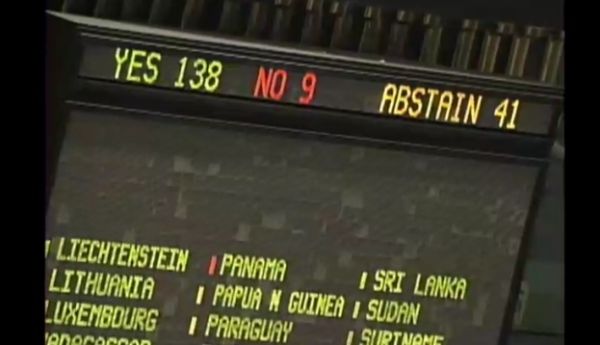Palestine's UN Observer State Status Approved by General Assembly

The members of the United Nation General Assembly voted yesterday to approve Palestine's UN observer state status. Although the state is not an official member, this action marks an historic event for Palestine and its quest to statehood.
November 29th, which was declared the International Day of Solidarity with the Palestinian people by a UN resolution in 1977, was chosen by Palestinian President Mahmoud Abbas to bid for non-member observer state status.
https://twitter.com/UN_PGA/status/274176848865406976
During his speech at the UN General Assembly, Mahmoud Abbas said member states had a moral duty, an historical duty and a technical duty to salvage chances of peace. He called on the nations of the world to vote in favor of the resolution and create the "birth certificate of the reality of the state of Palestine."
The Ambassador of Israel to the UN, Ron Prosor, repeated Israel's opposition to the resolution. There is "one route" to peace, Mr. Prosor said, and this includes "direct negotiation without pre-conditions between Jerusalem and Ramallah." He considered this unilateral initiative in front of the United Nation as conter-productive in the search for a peaceful solution to the conflict in Israel/Palestine.
The outcome of the vote is no surprise, as many of the countries of the General Assembly have shown their support for a Palestinian State. The attention of the resolution, then, was centered on by what margin the "yes" vote would win, as well as potential policy changes from major western nations. The final count of the vote was 138 countries in favor, 9 against and 41 abstentions.
https://twitter.com/UN/status/274272130890350592
With 138 votes, more than two thirds of the member states, the General Assembly has overwhelmingly supported the upgrade of Palestine's status. Among those who voted against the resolution were Israel, the United States, Canada and the Czech Republic. The support of more than 15 nations within the European Union, including France, Italy, Spain, Austria, Greece and the abstention of all the others is a major achievement for the PLO.
This plebiscite by the world nations is a victory for Mahmoud Abbas which, since his election in 2005 at the head of the Palestinian Authority, has enjoyed few moments of success. This recognition within the UN forum is a means for the Palestinian leader to clearly establish some fundamental requirements for a solution in the conflict which, for Palestinians, include a state within the 1967 borders with the capital in east Jerusalem.
The new observer state status within the UN will allow Palestine to attend the General Assembly debates, and will increase its chances to join UN agencies and bodies like the International Criminal Court.
This success could give Mahmoud Abbas the legitimacy to revive negotiations with the PA's rivals, Hamas. The Palestinian Authority has lost most of its power in the Gaza strip, which makes up 40% of the Palestinian territories, and cooperation and agreements with Hamas would be necessary for steps towards peace.
The initiatives seems to have only further chilled relations between the Israelis and the Palestinians. On Thursday morning, Israeli Prime Minister Benjamin Netanyahu said: "The decision at the United Nations will change nothing on the ground. It will not advance the establishment of a Palestinian state. It will delay it further."
However, according to John Whitbeck, an American lawyer that has been counselling the PLO for two decades, this resolution could give Mahmoud Abbas an historical opportunity to leverage the Palestinian position by setting a deadline for negotiations and establish a set course of action for peace.
http://www.scribd.com/doc/114925330/United-Nations-General-Assembly




